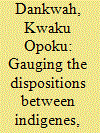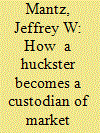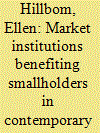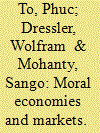| Srl | Item |
| 1 |
ID:
166619


|
|
|
|
|
| Summary/Abstract |
Existing studies have fixated on the macroeconomic implications of Chinese engagements with Africa with relatively less attention to micro-level exchanges and the attendant social consequences. This paper captures the nuances of everyday dispositions and attitudes of Ghanaian traders toward Chinese entrepreneurial migrants relative to ‘older and larger’ immigrant trading groups (notably Indians, Lebanese and Nigerians). The study elicited data from local traders and key informants from trade unions, public institutions and academia. The findings indicate that Chinese merchants often had ‘aggressive’ and ‘overly competitive’ business style compared to other migrants and indigenes. Accordingly, several seemingly unresolvable underlying tensions ensued between the Chinese and other traders. It was evident that contextual elements such as trust and sense of fairness shaped the attitudes and degree of cordiality between the trading groups. Going forward, it will be prudent to focus not only on the legal and political ramifications of Chinese migratory flows but also develop measures to integrate the Chinese in African environment socially.
|
|
|
|
|
|
|
|
|
|
|
|
|
|
|
|
| 2 |
ID:
079475


|
|
|
|
|
| Publication |
2007.
|
| Summary/Abstract |
Since 1995, Dominica has endured a massive economic downturn following a series of World Trade Organization decisions that have devastated the banana industry, its major export earner. Yet the trade decisions have not been the subject of much anxiety or debate. At the same time, their second largest contributors to foreign exchange earnings (hucksters) are seldom the subject of public discussion. I suggest in this article that these omissions have to do with the manner in which flexibility is culturally conceptualized. Rather than a recent adaptation to the physiopsychological disciplining of a post-Fordian or "globalized" economy, I argue that in Dominica, flexibility is historically constituted through a much longer engagement with capitalism in the formation of the Caribbean as a cultural area over the last five centuries. The entrepreneurial savvy found among hucksters is autochthonous to Dominica's trade culture.
|
|
|
|
|
|
|
|
|
|
|
|
|
|
|
|
| 3 |
ID:
120911


|
|
|
|
|
| Publication |
2013.
|
| Summary/Abstract |
Smallholders in developing countries can potentially benefit from access to local, regional, national and international markets as they intermediate between rural and urban demand for agricultural products and smallholder supply. This study investigates how smallholders in Meru, Tanzania make use of the various marketing channels that are available to them, and argues that the variety of potential marketing channels and easily accessible market information enables smallholders to weigh advantages and disadvantages with varying market opportunities and form rational decisions. It presents a case where producers, consumers and traders are the principal agents in building market institutions through what should be characterised as endogenous processes. As these market institutions correspond to smallholders' needs, they may be able to play an important role in the overall process of agricultural development in the area.
|
|
|
|
|
|
|
|
|
|
|
|
|
|
|
|
| 4 |
ID:
147456


|
|
|
|
|
| Summary/Abstract |
Vietnam's uplands have been increasingly integrated into commodity production for global markets. This paper focuses on the role of the cassava trader in connecting upland villagers as cassava producers to an emerging global cassava market. In Vietnam's Central Highlands, ethnic minority villagers engaging in a mixed economy of subsistence and cash crop production still practice communal resource use and reciprocal labour arrangements – customs associated with the (contested) notion of ‘moral economy’. In this context, traders have strategically traversed the insider–outsider divide, enlisting trust and reciprocity to extend the patron–client relationship between traders and villagers. In the absence of state support for upland communities, these traders have embedded themselves within village social relations through the provision of multiple goods and services, including loans. Villagers turn to these traders during times of hardship through degrees of mutual dependence in often unequal trade relations. The ‘benevolence’ of the traders, however, is an explicit strategy to legitimise their economic benefits. The relationship is deepened because traders fill a vacuum in state services by providing technical support to farmers cultivating cassava. Beyond benefiting themselves, in their status as community ‘insiders’, traders promote market penetration into the uplands with associated social and environmental implications.
|
|
|
|
|
|
|
|
|
|
|
|
|
|
|
|